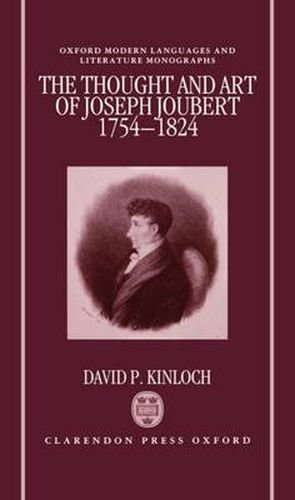Readings Newsletter
Become a Readings Member to make your shopping experience even easier.
Sign in or sign up for free!
You’re not far away from qualifying for FREE standard shipping within Australia
You’ve qualified for FREE standard shipping within Australia
The cart is loading…






This book rescues Joubert from the ranks of minor French moralistes, and, by tracing the development of his thought from his time as secretary to Diderot through to the period of his association with Chateaubriand, demonstrates that he was a writer on aesthetics of considerable sensitivity. Examination of his manuscripts and of his annotation to books in his library shows that Joubert’s primary concern, during the period that witnessed the gradual but profound change from the intellectual values of the Enlightenment to those of the Romantic period, was to establish the status and nature of art and poetry. Reading widely among philosophers and poets from Plato and Homer to Kant and Andre Chenier, Joubert consigned his thoughts and perceptions to a series of carnets which form the basis of this study and bear witness to an unusually eclectic and enquiring mind. Joubert’s significance is not confined to the Enlightenment and Romantic periods. He is unique among writers of his day in the way that his own interrogation of the very act of writing anticipates the aesthetic of later, highly influential writers such as Mallarme.
$9.00 standard shipping within Australia
FREE standard shipping within Australia for orders over $100.00
Express & International shipping calculated at checkout
This book rescues Joubert from the ranks of minor French moralistes, and, by tracing the development of his thought from his time as secretary to Diderot through to the period of his association with Chateaubriand, demonstrates that he was a writer on aesthetics of considerable sensitivity. Examination of his manuscripts and of his annotation to books in his library shows that Joubert’s primary concern, during the period that witnessed the gradual but profound change from the intellectual values of the Enlightenment to those of the Romantic period, was to establish the status and nature of art and poetry. Reading widely among philosophers and poets from Plato and Homer to Kant and Andre Chenier, Joubert consigned his thoughts and perceptions to a series of carnets which form the basis of this study and bear witness to an unusually eclectic and enquiring mind. Joubert’s significance is not confined to the Enlightenment and Romantic periods. He is unique among writers of his day in the way that his own interrogation of the very act of writing anticipates the aesthetic of later, highly influential writers such as Mallarme.